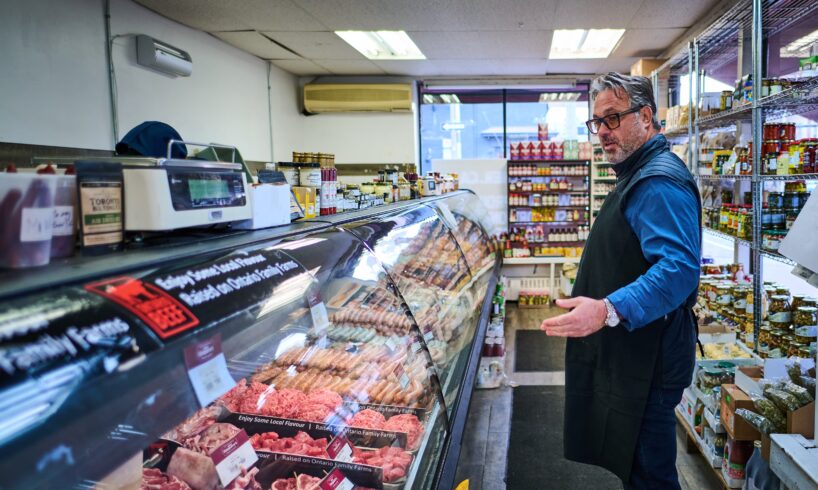
If you’re reading this on the web or someone forwarded this e-mail newsletter to you, you can sign up for Globe Climate and all Globe newsletters here.
Good afternoon, and welcome to Globe Climate, a newsletter about climate change, the environment and resources in Canada.
I’m Kate, the agriculture and food policy reporter for The Globe and Mail. You’ll be in my hands this week while Sierra eats a mountain of tacos in Mexico City.
Speaking of tacos, we’ll be talking about beef, the beleaguered cattle rancher and why some of Prime Minister Mark Carney’s major projects might be more than Canada can stomach.
Giddy up.
Noteworthy reporting this week:
Fact check: These are Carney’s new major projects, and some of them won’t be easy to finish. Tarnished gold: Once a war zone, this region of Ethiopia became a ‘Wild West’ of illegal mining and unsafe labour. Sites licensed by Canadian firms were at the heart of it.Photo essay: How a failed voyage through the Northwest Passage aboard a century-old tall ship serves as a reminder that there is still much to learn from the Arctic and its Indigenous Peoples. Wildlife: Jonathan the 192-year-old tortoise could outlive me and you. His species deserves respect.
A deeper dive
What’s the beef?
Open this photo in gallery:
Nick Gasparro shows the variety of prime meat cuts for sale at Vince Gasparro’s meat market in Toronto on Nov. 12, 2025.Sammy Kogan/The Globe and Mail
This fall, U.S. President Donald Trump launched a crusade against ranchers and meat packers as he fights to deliver on his campaign promises and get food prices down. (Beef is the No. 1 culprit of food inflation in the U.S. and Canada. Prices are 23 per cent above the five-year average).
But the White House is misinformed. There are few villains in this story. Pricey beef is not a matter of greedy ranchers or consolidated slaughterhouses. It is a matter of climate change.
Back-to-back droughts from 2021 to 2023 rivalled the dust bowls of the 1930s, parching the pastureland and sending the price of hay skyrocketing. Ranchers had no choice but to take their cows to market. This year consumers are facing the consequences.
In this story published Thursday, I introduce you to three stakeholders: the butcher, the burger flipper and the rancher. Together, they explain what is happening and what is at stake in this increasingly tense moment for North American beef.
What else you missed
Opinion and analysis
Carney’s major projects patchwork leaves holes in our economic growth
We have turned Canada’s major-project announcements into what feels like a raffle, with everyone from investors to businesses to economists checking to see whose number comes up.
— Candace Laing is the president and chief executive of the Canadian Chamber of Commerce.
A muted COP30 belies declining Western fortunes in a changing world
Whether pressured by Washington, or seizing licence from it, many countries, Canada among them, have backpedalled on their climate policies as politicians who say we can’t afford the luxury of solving climate change gain influence.
— John Rapley is a contributing columnist for The Globe and Mail. He is an author and academic whose books include Why Empires Fall and Twilight of the Money Gods.
Green Investing
Canadian companies are making energy-transition plans – but quietly
More large Canadian companies are making plans to operate in a low-carbon economy, but their zeal for trumpeting green accomplishments has waned against the backdrop of regulatory worry, a coalition of domestic and international institutional investors says.
The Climate ExchangeWe’ve launched the The Climate Exchange, an interactive, digital hub where The Globe answers your most pressing questions about climate change. We have been collecting hundreds of questions and posing them to experts. The answers can be found with the help of a search tool developed by The Globe that makes use of artificial intelligence to match readers’ questions with the closest answer drafted. You can ask a question using this form.
Photo of the week
Open this photo in gallery:
Munduruku Indigenous people block access to the UN Climate Change Conference (COP30) in Belem, Brazil, Nov. 14 2025.Adriano Machado/Reuters
Guides and Explainers
Catch up on Globe Climate
We want to hear from you. E-mail us: GlobeClimate@globeandmail.com. Do you know someone who needs this newsletter? Send them to our Newsletters page.





